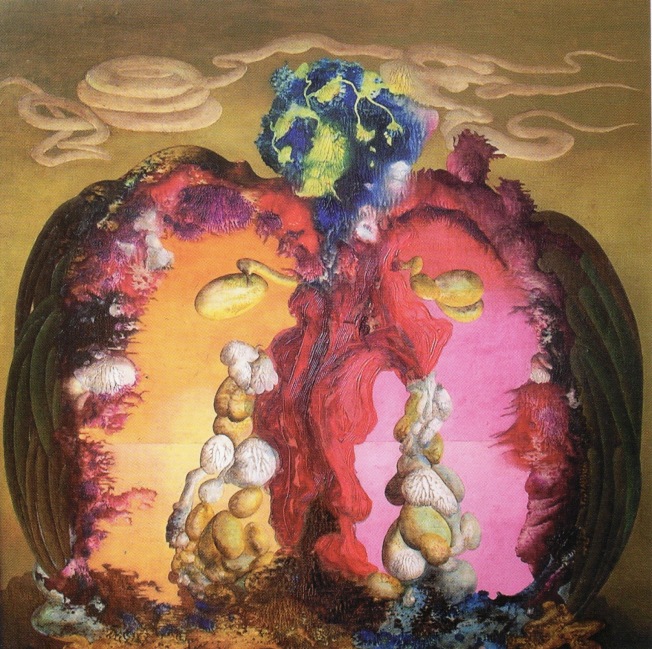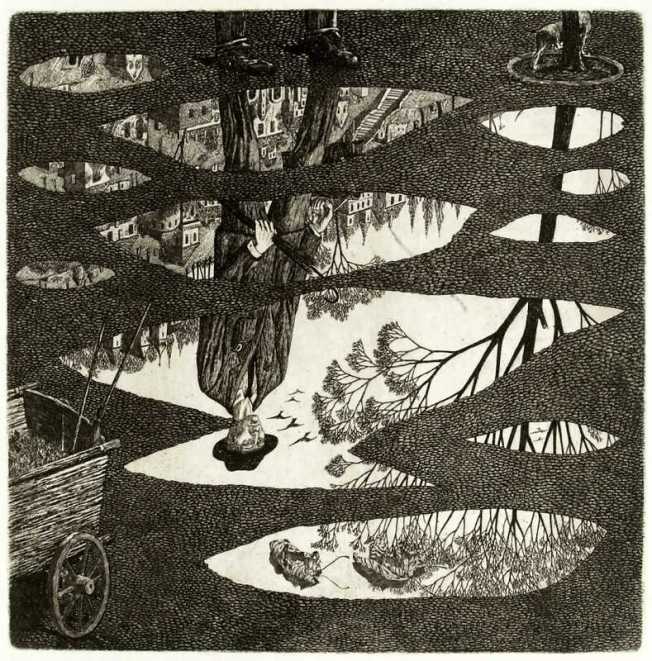
Pavel Simon, Title n/a.
Peter Redgrove, Corposant.
A ghost of a mouldy larder is one thing: whiskery bread,
Green threads, jet dots,
Milk scabbed, the bottles choked with wool,
Shrouded cheese, ebony eggs, soft tomatoes
Cascading through their splits,
Whitewashed all around, a chalky smell,
And these parts steam their breath. The other thing
Is that to it comes the woman walking backwards
With her empty lamp playing through the empty house,
Her light sliding through her steaming breath in prayer.
Why exoricse the harmless mouldy ghost
With embodied clergymen and scalding texts?
Because she rises shrieking from the bone-dry bath
With bubbling wrists, a lamp and steaming breath,
Stretching shadows in her rooms till daybreak
The rancid larder glimmering from her corpse
Tall and wreathed like moulds or mists,
Spoiling the market value of the house.
Herbert Palmer, Rock Pilgrim.
Let the damned ride their earwigs to Hell, but let me not join them.
For why I should covet the tide, or in meanness purloin them?
They are sick, they have chosen the path of their apple-green folly,
I will turn to my mountains of light and my mauve melancholy.
Let their hands get the primrose — God wreathe me! — of lowland and lagland;
For me the small yellow tormentil of heath-hill and cragland.
Man’s days are as grass, his thought but as thistle-seed wind-sown;
I will plod up the pass, and nourish the turf with my shinbone.
I should stay for a day, I should seek in high faith to reclaim them?
But the threadbare beat straw, and the hole in my shirt will inflame them.
They are blinder than moles, for they see but the flies in God’s honey;
And they eat off their soles; and they kneel to the Moloch of money.
They have squeezed my mouth dumb; their clutch for a year yet may rankle.
I will tie Robin Death to my side, with his claw on my ankle.
Let them come, stick and drum, and assail me across the grey boulders;
I will flutter my toes, and rattle the screes on their shoulders.
Let the damned get to Hell and be quick, while decision is early.
I will tie a red rose to my stick, and plant my feet squarely.
My back shall be blind on their spite, and my rump on their folly;
I will plod up the ridge to the right, past the crimson green holly.

Ithell Colquhoun, The Gorgon. 1946.
Paul Celan, Psalm.
(Translated by Michael Hamburger.)
Praised be your name, No one.
For your sake
we shall flower.
Towards you.
A nothing
we were, are, shall
remain, flowering:
the nothing -, the
No one’s rose.
With
our pistil soul-bright,
with our stamen heaven-ravaged,
our corolla red
with the crimson word which we sang
over, O over
the thorn.


